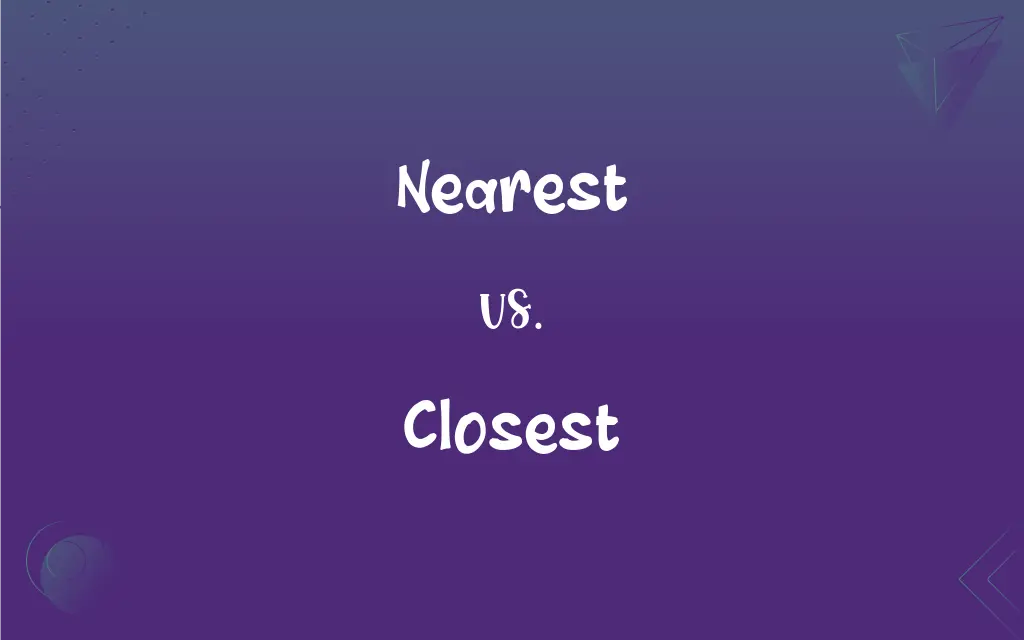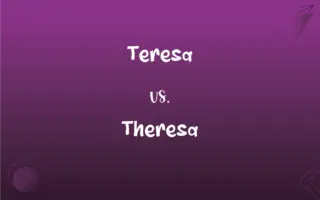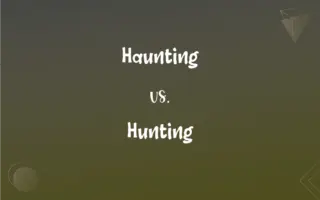Nearest vs. Closest: What's the Difference?
Edited by Harlon Moss || By Janet White || Updated on October 5, 2023
"Nearest" and "Closest" both denote proximity, with "Nearest" often implying directness while "Closest" can also suggest a relationship or affinity.

Key Differences
Nearest and Closest are often interchangeable, denoting something's proximity or short distance from a reference point. However, Nearest often points to the most direct or immediate proximity, while Closest can have a broader context.
In many contexts, using Nearest or Closest won't change the intended message. For instance, asking for the "nearest gas station" or the "closest gas station" would yield the same result. Yet, Nearest feels slightly more immediate or direct.
Beyond physical proximity, Closest can also imply emotional or relational proximity. One might refer to their "closest friend," suggesting a deep bond. Using Nearest in this context would sound unnatural.
Nearest can also denote the next in order or sequence. For instance, in the phrase "the nearest future," it indicates the immediate future. Closest, on the other hand, doesn't typically carry this sequential implication.
While both words can often be used interchangeably in terms of physical proximity, they have nuances that make them distinct in different contexts. Nearest leans towards directness, while Closest can also indicate relational closeness.
ADVERTISEMENT
Comparison Chart
Primary Use
Direct or immediate proximity
General proximity, can also suggest relationships
Contextual Nuance
Often more immediate or direct
Broader, can denote affinity
Relational Use
Rarely used for relationships
Commonly used (e.g., closest friend)
Sequential Implication
Can denote next in order (e.g., nearest future)
Rarely has this implication
Interchangeability
Often interchangeable with "Closest" in physical proximity
Commonly interchangeable with "Nearest" in terms of distance
ADVERTISEMENT
Nearest and Closest Definitions
Nearest
Direct or straightforward in terms of distance.
The nearest route is through the park.
Closest
Closestaving a tight bond or relationship.
Examplehe is my closest ally in the project.
Nearest
Next in order or sequence.
We'll see changes in the nearest future.
Closest
Closestost similar or alike.
Examplehat color is the closest match to the original.
Nearest
To, at, or within a short distance or interval in space or time
Moved the table nearer to the wall.
As graduation draws near.
Closest
Closestost confidential or trusted.
Example shared my secret with my closest friend.
Nearest
Just about; almost; nearly
Was near exhausted from the climb.
Closest
Being near in space or time. See Usage Note at redundancy.
Nearest
With or in a close relationship
It turns out we are near related.
Closest
Being near in relationship
Close relatives.
Nearest
Close in time, space, position, or degree
Near neighbors.
Near equals.
Closest
Bound by mutual interests, loyalties, or affections; intimate
Close friends.
Nearest
Closely related by kinship or association; intimate
A near relative.
A near and dear friend.
Closest
Having little or no space between elements or parts; tight and compact
A close weave.
Nearest
Nearly occurring but not actually happening
A near victory.
A near disaster.
Closest
Being near the surface; short
A close haircut.
Nearest
Just barely avoided
A near hit by the incendiary bomb.
Closest
Being on the brink of
Close to tears.
Nearest
Closely corresponding to or resembling an original
A near likeness.
Closest
Decided by a narrow margin; almost even
A close election.
Nearest
Closely resembling the genuine article
A dress of near satin.
Near silver beads.
Closest
Faithful to the original
A close copy.
Nearest
Closer of two or more
Take the near street and then turn right.
Closest
Very attentive; rigorous; thorough
A close reading.
Close supervision.
Nearest
Being on the left side of an animal or vehicle.
Closest
Shut; closed.
Nearest
Being the animal or vehicle on the left.
Closest
Shut in; enclosed.
Nearest
Short and direct
The nearest route to town.
Closest
Confining or narrow; crowded
Close quarters.
Nearest
(Archaic) Stingy; parsimonious.
Closest
Fitting tightly
Close garments.
Nearest
Close to
An inn near London.
Closest
Warm and humid or stuffy
Close weather.
A close room.
Nearest
To come close or closer to
The plane neared the terminal.
Closest
Confined to specific persons or groups
A close secret.
Nearest
To draw near or nearer; approach
As the holiday nears.
Closest
Strictly confined or guarded
Kept under close custody.
Nearest
Closest to.
Mercury is the planet nearest the Sun.
Closest
Secretive; reticent
Was close about her personal life.
Nearest
(superlative of `near' or `nigh') most near
Closest
Giving or spending with reluctance; stingy
He is known to be close with his money.
Nearest
(superlative of `near' or `close') within the shortest distance;
That was the time he came nearest to death
Closest
Not easily acquired; scarce
Money was close.
Nearest
Immediate proximity.
The nearest store is two blocks away.
Closest
(Linguistics) Pronounced with the tongue near the palate, as the ee in meet. Used of vowels.
Nearest
Shortest distance from a point.
Take the nearest exit to reach the hotel.
Closest
Marked by more rather than less punctuation, especially commas.
Nearest
Least complicated or most direct.
The nearest explanation is often the correct one.
Closest
To move (a door, for example) so that an opening or passage is covered or obstructed; shut.
Closest
To bar access to
Closed the road for repairs.
Closest
To fill or stop up
Closed the cracks with plaster.
Closest
To stop the operations of permanently or temporarily
Closed down the factory.
Closest
To make unavailable for use
Closed the area to development.
Closed the database to further changes.
Closest
To bring to an end; terminate
Close a letter.
Close a bank account.
Closest
To bring together all the elements or parts of
Management closed ranks and ostracized the troublemaker.
Closest
To join or unite; bring into contact
Close a circuit.
Closest
To draw or bind together the edges of
Close a wound.
Closest
(Sports) To modify (one's stance), as in baseball or golf, by turning the body so that the forward shoulder and foot are closer to the intended point of impact with the ball.
Closest
To complete the final details or negotiations on
Close a deal.
Closest
(Archaic) To enclose on all sides.
Closest
To become shut
The door closed quietly.
Closest
To come to an end; finish
The book closes on a hopeful note.
Closest
To reach an agreement; come to terms
We close on the house next week.
Closest
To cease operation
The shop closes at six.
Closest
To be priced or listed at a specified amount when trading ends
Stocks closed higher on Monday.
Closest
To engage at close quarters
Closed with the enemy.
Closest
To draw near
The orbiter closed with the space station in preparation for docking.
Closest
To come together
My arms closed around the little child.
Closest
(Baseball) To finish a game by protecting a lead. Used of relief pitchers.
Closest
The act of closing.
Closest
A conclusion; a finish
The meeting came to a close.
Closest
(Music) The concluding part of a phrase or theme; a cadence.
Closest
(klōs) An enclosed place, especially land surrounding or beside a cathedral or other building.
Closest
(klōs) Chiefly British A narrow way or alley.
Closest
(Archaic) A fight at close quarters.
Closest
In a close position or manner; closely
Stayed close together.
Closest
(superlative of `near' or `close') within the shortest distance;
That was the time he came nearest to death
Closest
Closestn close proximity.
Examplehe closest bakery sells delicious croissants.
Closest
Closestearly accurate or exact.
Exampleis guess was the closest to the actual number.
FAQs
How do I decide between "Nearest" and "Closest"?
Consider context: "Nearest" for directness, "Closest" for broader proximity or relationships.
Would "Nearest friend" sound natural?
Typically, "Closest friend" is more natural, denoting a deep bond.
Is "Closest" always about location?
No, it can also refer to relationships, similarities, or affinities.
Which is more formal, "Nearest" or "Closest"?
Both are standard in English, with formality depending on context.
Can "Nearest" denote directness?
Yes, it often points to the most direct or straightforward option.
Can "Nearest" denote the next in sequence?
Yes, as in phrases like "the nearest future."
Does "Closest" only refer to physical proximity?
No, "Closest" can also suggest relational or emotional closeness.
Can "Nearest" and "Closest" be used interchangeably?
Often in terms of physical distance, but they have nuances in different contexts.
Can "Closest" mean most alike?
Yes, as in "The two paints are the closest match."
Can "Closest" be about resemblance?
Yes, suggesting the greatest similarity or likeness.
Can "Closest" imply accuracy?
Yes, as in "His answer was the closest to the truth."
How does "Nearest" relate to simplicity?
It can denote the most direct or least complicated option.
Do both words have old origins?
Yes, both derive from Old English, denoting nearness.
Is "Nearest" more direct than "Closest"?
Often, "Nearest" suggests a more immediate or direct proximity.
How does "Closest" relate to trust?
It can denote a high level of trust, as in "Closest confidant."
How do the two words differ in nuances?
"Nearest" often feels more immediate, while "Closest" has broader implications.
Is "Closest" always the best choice for relationships?
Typically, "Closest" is more apt for emotional bonds than "Nearest."
Is "Closest" used in mathematics?
Yes, like when approximating values or finding the closest number.
Is "Nearest" only about distance?
Primarily, but it can also indicate sequence or simplicity.
Do both words have multiple meanings?
Yes, context is key. "Nearest" can imply directness, while "Closest" can suggest relationships or similarities.
About Author
Written by
Janet WhiteJanet White has been an esteemed writer and blogger for Difference Wiki. Holding a Master's degree in Science and Medical Journalism from the prestigious Boston University, she has consistently demonstrated her expertise and passion for her field. When she's not immersed in her work, Janet relishes her time exercising, delving into a good book, and cherishing moments with friends and family.
Edited by
Harlon MossHarlon is a seasoned quality moderator and accomplished content writer for Difference Wiki. An alumnus of the prestigious University of California, he earned his degree in Computer Science. Leveraging his academic background, Harlon brings a meticulous and informed perspective to his work, ensuring content accuracy and excellence.
































































